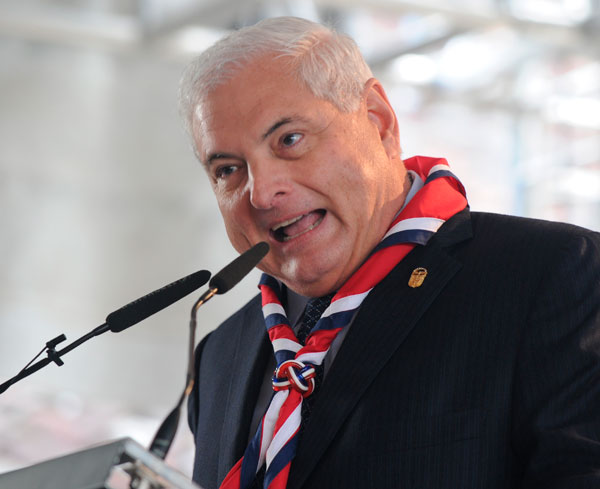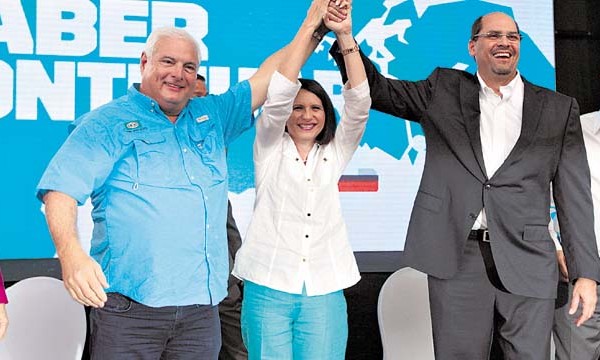While left-wing populists like Julius Malema have received much more attention internationally as South Africa prepares for its national elections on May 7, Mmusi Maimane is the rising star to whom the rest of the world should be paying attention.![]()
He’s quickly becoming one of the chief spokespersons for the Democratic Alliance (DA), the largest opposition party in South Africa. Although polls show that the DA will nonetheless lose next month’s elections by a massive margin to the ruling African National Congress (ANC), the DA hopes to build on its gains from 2004 and 2009 to win its greatest level of voter support yet.
In Gauteng, the economic and financial hub of South Africa, and the most populous province in the country with 12.25 million people, Maimane is campaigning hard to become Gauteng’s next premier in one of nine provincial elections that are taking place simultaneously with national elections.
Maimane (like a growing number of world politicians) has been compared to Barack Obama for his quick rise, youthful image and the liberal use of the Obama playbook in his campaign for premier. In 2011, he ran for mayor of Johannesburg, South Africa’s largest city, and he wound up as the opposition leader of the city council. At 33, he’s waging a credible campaign against the ANC, anchored with a pledge to sort legal title for over 200,000 urban South Africans who have only informal ownership of their homes.
Critics in the ANC charge that he’s a convenient black face for a party that draws support predominantly from the white community in South Africa. But as the DA’s support grows, and voters become disenchanted with the ANC, especially the so-called ‘born-frees,’ the emerging class of young voters who never lived under apartheid, voting patterns are slowly changing. If Maimane leads the DA to victory in Gauteng — or even wages a sufficiently tight race — he’ll easily become the party’s dominant figure.
He’s capitalized on the ANC’s unpopularity in several regards — police brutality deployed against miners during a strike in Marikana a couple of years ago, pervasive corruption that’s now highlighted by $23.5 million in state spending for ‘security improvements’ to president Jacob Zuma’s home in Nkandla, and pervasive unemployment among South Africa’s young, urban, black population.
Here’s an ad from last month that went viral after South Africa’s government tried to ban it from the airwaves — it shows just how damning the anti-Zuma and anti-ANC message has become:
It also helps that the ANC in Gauteng is divided by rival factions — that’s why the incumbent, Nomvula Mokonyane, doesn’t seem to be running for reelection, and the provincial secretary general David Makhura is leading the ANC campaign, even though the ANC hasn’t formally announced a candidate for premier.
Dali Mpofu, a longtime ANC politician — who once allegedly had an affair with Winnie Mandela in the 1990s — left the ANC to join Malema’s socialist Economic Freedom Fighters (EFF) in November 2013, and is leading the EFF’s efforts as its premier candidate in Gauteng. That, too, could pull votes away from the ANC, much to Maimane’s benefit.
Given those dynamics, and given Maimane’s serious policy proposals and considerable political talent, it’s a puzzler why Maimane isn’t the overwhelming favorite in the race.
Some of the answer lies in the wariness of South African voters to turn away from the ANC, which still looms mythically for its role in ending white apartheid rule 20 years ago.
In 2009, the Democratic Alliance won 16.66% of the vote and increased its representation in the 400-member National Assembly from 47 to 67, and it won control of the Western Cape province. Polls show that the Democratic Alliance will win between 20% and 25% this time around. The DA is expected to retain control in Western Cape (where the DA’s leader Helen Zille, a white former Cape Town mayor and former journalist and anti-apartheid activist, serves as premier). It will also contest for control of Northern Cape province as well. Continue reading Who is Mmusi Maimane? (Possibly the next premier of Gauteng).


